Eeek! A Snake!

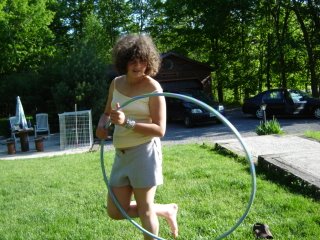
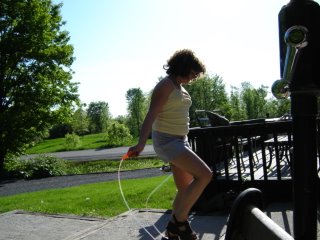 Two actually. Same morning, like venue, two snakes. Oh, too much to bear. The horror of it all! She informed me breathlessly over the telephone that morning WHAT SHE HAD SEEN. Gardener snakes! One, where else? in the rock garden. The other, a little later, by the pond behind the house. Wetland, really. It's spring, after all, and they're enjoying the warmth, cozying up on sun-warmed rocks.
Two actually. Same morning, like venue, two snakes. Oh, too much to bear. The horror of it all! She informed me breathlessly over the telephone that morning WHAT SHE HAD SEEN. Gardener snakes! One, where else? in the rock garden. The other, a little later, by the pond behind the house. Wetland, really. It's spring, after all, and they're enjoying the warmth, cozying up on sun-warmed rocks.
When, several hours later, we had arrived for our usual weekly visit, she waved to us from the glassed-in foyer of the house, but made no move to join us out-of-doors, although the dogs did, bursting forth in a wild froth of collective joy at their liberation as though they're normally kept so cruelly as prisoners in the house. Our daughter was at the side of the house, mowing the grass there, the last bit to be done that day.
All of us wanted to be outside, enjoying a truly glorious day of sunshine, mild temperatures and gentle breezes. When I poked my head into the foyer and called for her to join us, a disembodied voice came floating back at me declaring the out-of-doors off limits. Forever. Off went my shoes and in I went to confront the recalcitrant child.
No, Bubbe! I can't! Didn't I explain it to you already? Two snakes, I saw two snakes! Well, I told her, they likely weren't too thrilled to see her, as a matter of fact. They probably coiled themselves back in shock and slithered away in panic once their sense of self-preservation kicked in. They probably babbled to their great big mother snake about the horrid experience they'd just had, coming face to face with...a human kid!
Very funny, Boob, said she, very funny. I mean it. I.will.not.go.out! Never!not.ever.Again!!
In fact, she stayed in the house, poor traumatized kid. For a while, anyway. Eventually I was conscripted to play jump-rope with her, and throw her hula-hoop at her, in the unusual absence of one or more of her girlfriends who are usually there to whoop it up with her. Could be they heard about the snakes, too.
Theories and Suppositions - Wrong!
 Well, perhaps, perhaps not. You be the judge.
Well, perhaps, perhaps not. You be the judge.
You know how often entomolygists point out that bees and ants represent the perfect society, in the sense that individuals appear to be without ego. Which is to say these tiny creatures appear to be perfectly regimented. Their focus is on co-operation, each subjecting itself to a quite specific role within the group, all meant to profit the collective. Profit, that is, in the sense of ensuring continuity, thus obeying the biological imperative of survival. Unlike, for example, mankind, whose survival instinct appears to be restricted to one single organism; itself.
The group activities of bees and ants are held to be the perfect example of altruism. Extending oneself for the betterment of the collective, even at the sacrifice of oneself. Of course, altruism means performing acts that favour the well being or the favourable outcome of another, taking back nothing for oneself, even acknowledgement of sacrifice. Hence, the perfect society.
Of course, there is always royalty; the queen bee, the queen ant, the actual producers of the young whom all others of their tribe sacrifice themselves through dutiful obeisance to worker- or soldier-genes to nourish, protect and in so doing ensure the survival of their species. The nomenclature sounds so grand, but pity the poor queen bee for she, like her anty counterpart is also a prime sacrifice of nature.
Anyway, from a human perspective: what a drag! Who needs it? Granted, we have our own versions of queen bees and ants, soldiers, workers, people in an absolute rut, hating their place in society, in the grand order of things, wishing desperately for a break in their unalterable routine - anything! We are not sanguine in the face of personal restrictions, pre-ordained lifestyles, constricting expressions of personality and character.
Well, guess what? I've discovered something that should be of wild interest to scientists, evolutionists, biologists and yes, entomologists. Bear with me. While noodling about in our rock garden two days ago, I espied two large and very diligent (what else?) black ants. And they were very busy indeed. On closer inspection I realized that they had between them one of their own kind, presumably gone to greener pastures. So did I witness co-operation here? Actually, the two ants on either side of the toit one were pulling in opposite directions. So what gives? Don't believe me? I had a witness; our Great Daibutsu was there, at the bottom of the rock garden, amusing himself at the revelation that this spectacle afforded us both.
After some idle speculation I continued on my way, inspecting other insects in our garden: interlopers, aphids on my roses! Damn, and more damn. But I recalled the incident this morning when Irving and I were circumnavigating the ravine and I recounted it to him. This man's wisdom is without peer, he knew immediately what it meant and there was no hesitation in his reply:
"Burial", "No! Cremation!" Followed, naturally, by "Anglican", "No! Roman Catholic".
So there.
Unionists and Academics = Ugly Alliances
There was a time when unions in the Western world had their place. They led the struggle to attain fair wages, hours of work and workplace safety for countless unvoiced workers and working immigrants, when rapacious, profit-hungry factory owners viewed their labour force as expendible creatures of inconvenient requirements. How times have changed.
Unions, and those who lead them are no longer the altruistic and courageous entities they were once perceived to be, but rather self-interested and ego-driven more interested in the perceived power they are able to wield than workers' interests. By and large, a self-correcting Western society sees the utility of treating workers justly if for no other reason than when workers are paid well and treated fairly they reciprocate in kind. That, in any event, is the ideal, not always realized, but there to be had when both 'sides' in the equation are mature enough to recognize and act on achieving co-operative mutual success.
Unions, on the other hand, believe most governments, corporations and businesses have the bottom line in mind, and they are profit-driven without regard for workers' rights. And they're right too, for the most part. In this modern world, when workers' demands are seen to become too onerous and impede both progress and profit, it has become relatively simple to move operations offshore where low-wage economies produce cheaper-produced goods that will sell at the same price, but yielding larger profits.
Still, unions are a force to be reckoned with, and they still wield great influence in some countries. Much as do academics in the universities of Western societies who, like their union brethren tend to be left-leaning, almost as a tenet of pride: here we are, the super-intelligent who educate the fortunate young who will truly inherit the reins of corporate power and government, but we're also aligned with the downtrodden, the underprivileged, the disadvantaged. We lead the way! they seem to proclaim - Toward a better world!
The ancient Greek philosophers saw great utility in hard physical labour, while at the same time honing the mind to understand nature's deepest- and most dearly-held secrets. Someone who worked as a potter could also be recognized by his coevals as having the greatest enquiringly logical mind of all time. So perhaps the partnering of unions and academics in a joint mission to champion the oppressed, to shed light on the problematical, the offer solutions to better mankind, shouldn't be all that puzzling.
All that is theory, of course. The reality can be different, and quite, quite nasty. That the Canadian Union of Public Employees has followed others of their ilk to join an international campaign of boycott, divestment and sanctions against Israel is incomprehensible. Labelling the State of Israel as an apartheid state, the protective wall as a racist divide, serves only to demonstrate the gross stupidity of those CUPE delegates whose decision it was to use the union dues of hundreds of thousands of CUPE members unwisely, to say the least.
Of course in so doing they join the ranks of leftist academics who have themselves formed race-driven campaigns to stigmatize the State of Israel and, presumably pressure and shame the country into self-abnegating surrender of their very existence in favour of completely abandoning the ideal of a Jewish homeland which also happens to be an ancestral homeland, one which practises a democratic ideal, one in which workers' rights are recognized and awarded to its citizens, one in which the citizens are forced to live in fear of their very survival, surrounded by belligerents determined by any violent means available to them to deny their right to exist.
In so doing the unions and the academics bring shame upon themselves for their deliberately ignorant lack of awareness of where the truth lies, in favour of a misconstrued situation moulded to fit their very peculiar, and most particular ideas of a just society.
In the Valley of Darkness
Yes, I was a skeptic. Yes, I was more than ready to believe that Pope Benedict, the former Cardinal Ratsinger, former member of the Hitler Youth, former member of a Nazi artillery brigade, was still what he was formerly. Can I now admit to a belief that I have wronged the man? I would very much like to believe that to be so.
This man, a religious leader to 1.1 billion Roman Catholics world wide, is publicly paying homage to and personally grieving the long suffering of the Jews. He is striving to ameliorate the millennia-long enmity between the fathers of his church and the Jewish people. He appears honestly to bear a burden as a German, as a religious figure of great repute and world wide respect and honour, for the past harm done to Jews as figures of biblical iniquity, and latterly as mass subjects of the world's most brutal attempt at complete "racial" extermination.
Pope Benedict has made an anguished enquiry of his God, but God will not respond. It was not God who committed boundless atrocities against the Jews of history and of today, and the world at large, after all, but great groups of hate-filled fanatics who sought to shape the world to their lunatic dream of conquest. But Pope Benedict has, nonetheless, held his peerless God to account for his acceptance of the event, without divine intervention. And he laments that fact of icy history.
Should this Pope's attempts to find reason in the unreasonable, to find forgiveness for the unforgivable, to discover hope when all seems utterly hopeless, be rewarded by infecting his flock with a similar quest, then he will have performed his function upon this earth in the name of his god. Then can he indeed intone those immortal prayerful words of the Psalm:
He leads me in right paths for his name's sake. Even though I walk through the valley of the shadow of death, I fear no evil; for you are with me; your rod and your staff -- they comfort me ... I shall dwell in the house of the Lord my whole life long.
This man wears the intellectual, emotional and righteous robes of his office very well indeed.
In the Shadow of Death
Pity the poor people of Indonesia. Truly victims of geographic location, of nature at her fiercest, of utter helplessness in the face of both unalterable realities. Whether it be volcanic eruptions, earthquakes or the resulting tsunamis, they have faced the full force of some of nature's worst catastrophies to be visited upon mankind.
When one revisits the calamity of the 2004 Boxing Day earthquake/tsunami fall-out in the death of 170,000 people in the province of Aceh alone, it boggles the mind. The national trauma left in the wake of that disaster of such humanly unimaginable scope can hardly have begun to heal, much less the full range of reconstruction, before people were again faced with the inevitability of a volcanic eruption, and the resulting evacuations in anticipation of the event.
Then the earthquake which current statistics indicate have killed an estimated five thousand people, and left countless thousands others homeless, panic-stricken, wounded and ill. Thousands of Indonesians are mourning their dead, facing an uncertain future. The disaster and its aftermath brings to mind the fact that many other areas of the world also have serious fault lines in the earth-crust, where plates grind and give promise of a "big one". Were it to happen here, in Canada, on our West Coast or even here in Ottawa, would we be any more prepared to deal with the after-effects? Would our disaster relief organizations be any more capable of coping with events on such an unprecedented scale as the government of Indonesia?
As economically poor as Indonesia is, they have had to cope with actual disasters on a wider scale, similar to those of other disaster-prone regions of the world such as Japan, Iran, Pakistan, where earth-shaking upheavels have wrought complete disaster on populations clearly unable to cope. The truth is, nowhere on earth is there a population or a government capable of coping with upheavals of this nature; they are legendary in the scope of their destruction, in the clear inability of government to cope. Wealthy countries such as the United States with all their organizational capabilities and national wealth are helpless in the face of natural disasters, and do little better than their poorer counterparts in rescue, relief and rehabilitation.
Yea, we do indeed live in the shadow of death, never knowing where or when the Grim Reaper will strike.
The Art of Avoidance
We all do it. Some of us manage to perfect the art of avoidance to an arcane art. Most of us practise avoidance in one way or another. Procrastination? Avoidance usually of a temporary nature, but bound to fail. I indulged in some avoidance of my own this evening, while chuckling at the avoidance clumsily set into motion by others doing their utmost to avoid my very presence.
I had another door-to-door canvass to carry off. This time for the Canadian National Institute for the Blind. And guess what? That's my total effort for this year. Two such canvasses are more than enough for one person to inflict on her neighbours. Three of them, four, and you're nudging the abyss. I'd already been out one evening last week and brought my temporary mission to the fortunate inhabitants of the top half of the street on which I live. Tonight I blessed the bottom half of the street with my knock-on-the-door and intrusionary intro.
When I've canvassed for charitable enterprises like Heart and Stroke, Arthritis Society, I had no true vested interest. When I canvassed for the Canadian Diabetes Association and the Salvation Army, I did have a deep interest in the success of the canvass, although whatever canvass I'm associated with I do pursue my part with conviction. I've always canvassed for the Canadian Cancer Society, even before my parents had their private conversations with cancer. And since my sister is legally blind, there's my connection with CNIB. On the other hand, I recognize the need of these groups and someone has to help, so I'm just one of many who contribute their time and energy to the process.
It is a truly miserable thing to do; to knock on a door for the purpose of extracting money from unwilling householders. Even if a notable percentage of those canvassed understand the process, the reason for it, its place in the functioning of a healthy society. Needless to say these are, for the most part, that segment of the population who agree with the transaction. Of the others, those who view the canvasser with suspicion and hostility, who can blame them? It's an intrusion into someone's privacy. No less so than that of the evangelical zeal of the Seventh Day Adventist, seeking to convert.
And even though I put off the actual process for as long as I'm able to, avoid going out until I can no longer live with the thought that it's still there and will remain there until the job is done, there are some aspects of this social arm-twisting that compensate. For you do see neighbours you ordinarily would not see, and some of them are well worth conversing and socializing with, albeit infrequently and superficially. Some of these contacts are valuable emotional transactions enriching the lives of the givee and the giver.
And some of the avoidance techniques practised imperfectly but effectively by many of those whose homes you approach are cause for introspective thought in the sense that one compartmentalizes "types", placing many of these avoidees in various categories of avoidance and social awareness or lack thereof. It cues you into mental gymnastics of a most interesting variety. That is, when you're not doing a silent simmer at the downright rude behaviour of some people - but just a minute here, who's the intruder?
In the final analysis all of us practise the type of civic and social interaction that experience and personality and economics places us in. And with the tools we have at hand, we do the best we can.
Ah, the Emerging Garden
 The roses have already set their buds. Already! I can hardly believe it. Surely they're early this year! And the tree peonies, I can scarcely believe it, the huge pink blossoms of one have already begun to open. And the other tree peony, the yellow one, is close behind. The other peonies, the herbaceous ones aren't all that far behind. It'll take a few weeks yet, but they're getting there.
The roses have already set their buds. Already! I can hardly believe it. Surely they're early this year! And the tree peonies, I can scarcely believe it, the huge pink blossoms of one have already begun to open. And the other tree peony, the yellow one, is close behind. The other peonies, the herbaceous ones aren't all that far behind. It'll take a few weeks yet, but they're getting there.
The lilies-of-the-valley are in bloom and their perfume is divine. It embraces us as we walk past them, envelopes us in their sweet memories of another time, another place. The Tamarisk in the front, alongside the driveway, is in full pink plumey bloom, and I don't recall an earlier time when it was so glorious, so fragrant. right beside it, the bridalwreath sprirea is also in full bloom, covered with its tiny white blossoms.
The bearded irises have already sent up their flower heads, and the Siberian irises are right behind. The Icelandic poppies have thrust up their soft-looking, swollen buds and are ready to open, any time soon. The pasque flowers in the rock garden have been blooming for some time, and the creeping phlox is a carpet of mauve-pink. The secretive jack-in-the-pulpits have finally sprung through the earth, and their shy flower head, when tipped up reveals their striped purple-green interiors.
Good grief, I can hardly believe how long the Magnolia has been blooming this spring. It just keeps opening up bud after bud to gift us with those large, long-petalled, fragrant hot-pink blossoms. The azalea, though I cut it back very late last year, has opened its pale orange blooms, impossibly large for the size of the plant. And the rhododendrons too have begun to open their large passionately-red flowers. Beside the Magnolia, the two Sargentii crab trees are head-full of white blossoms.
Some of our clematis vines have already set flower buds, while others will await their opportunity, later in the summer. Leopard's bane is in full yellow-daisy flower. The painted daisy has set its blooms, and I can hardly wait, for it will be the first time we've had it flower.
I've planted cosmos, tuberous begonias, lobellia, gazania, porculaca, petunias, ornamental grasses, and so much more. Colour is emerging where before there was drab. The garden is coming to life. Annual poppies and much, much more have re-seeded sponaneously and they're promising us a summer garden beyond expectations.
Oh, the Dogs!
 I guess if anyone is really stupid enough to have seven dogs in a household they deserve all the pleasure they can get out of that decision. And pleasures there are aplenty. They've all got their own personalities, their predilections, dislikes, habits and irritating manoeuvres to try one's patience while laughing at their antics.
I guess if anyone is really stupid enough to have seven dogs in a household they deserve all the pleasure they can get out of that decision. And pleasures there are aplenty. They've all got their own personalities, their predilections, dislikes, habits and irritating manoeuvres to try one's patience while laughing at their antics.
If the dogs represent breeds like Chihuahua, Sheltie, Pomeranian, Malamute, German Shepherd, Australian Shepherd among them, so that the largest weighs over a hundred pounds, while the smallest weighs a mere 3-1/2 pounds, that further compounds and enhances the opportunities for complex situations and predicaments.
Personally, we've got enough with two dogs, a small female and a smaller male. The female's intelligence and independence far outstrips that of her smaller companion, whose slighter intelligence matches his smaller size, alas. She is patient and forebearing, and she is also connivingly clever. He is uber-dependent on his emotional needs, begging constantly to be carried about, bundled up, hugged and treasured; yet belligerent beyond belief when encountering another dog. The bigger it is the snarlier he gets.
And, too bad, many-to-most dogs have the unfortunate habit of enjoying a good roll. Well, you might ask innocently what could possibly be wrong with that? After all, dogs roll about happily in the grass, and so do kids, right? An expression of their joy in life. Yes, and much more.
I've read an explanation for the reason that dogs simply adore rolling in smelly patches of "things". Those "things" can be a dead worm, a decomposed animal, well rotted turds. The explanation I read somewhere revealed that the compulsion to roll in smelly objects is an ancient one, long before dogs were domesticated from their primal wolf forbears. When a wolf or a coyote sought an appropriate object to roll in it was with the intention of covering up its own scent, throwing off predators.
Well, you get the picture: use your imagination and you can come up with some fairly disgusting objects with which to express one's joy in life. How do you know when your dog indulges? Hard not to know. They reek. From the largest to the smallest they indulge, and they reek.
Last news from our daughter this morning was that two of her dogs, the big-big German Shepherd rescue from Iqaluit and the super-smart Sheltie both rolled during their walk in the woods. What was it this time? Bear scat. Don't ask.
Why Not a Cake?
As usual, thinking ahead to the day's menu, or in the case of Friday, considering the evening before what I might decide to bake for Friday night's dessert, I thought: why not a cake? Make that a chocolate cake. Haven't baked one for a little while, so might as well. Needn't bother to look up a recipe, as I find just thinking up the ingredients then and there always works better for me. Invariably, finding a recipe in the newspaper, for example, there seems always to be something unsatisfactory about those recipes. Like the one I saw in Wednesday's Food section of the paper for a "red" cake, some celebrity cook's recipe which, to attain the red colour, used a tablespoon of cocoa powder and two bloody ounces of red food dye. Anathema! Call that baking?
So this morning after breakfast I poured a few teaspoons of white vinegar into a measuring cup and topped it up with three-quarters of a cup of 2% milk, then set it aside. To curdle. Not spoiled milk, but rather deliberately soured milk. The better to bake you with, dear chocolate cake. And then I cut out two disks of waxed paper to fit into the bottoms of two round layer cake pans, and set them aside too, on the counter.
Measured out a half-cup of the best margarine money can buy: Becel. Added three-quarters of a cup of white sugar, one-quarter of a cup of dark brown sugar, two teaspoons of vanilla. Mixed until smooth, then added two eggs, one at a time, beating well between additions. Then I hauled out my triple flour sifter, set it over a bowl, and measured out one cup of cake and pastry flour, and sprinkled two teaspoons of baking powder over it, a few dashes of salt also. Good thing I bought another bag of cake and pastry flour last week, I thought, emptying the last of the flour bag into the cup and noting that it came to only one-third of a cup.
Out I hauled the new, as-yet-unopened bag of flour and thought how peculiar the new flour looked as I topped the second cup of flour up to two-thirds-full. That's when I took a second look at the printing on the bag, realizing that the flour looked "different" because it was different. I thought I had bought cake and pastry flour but obviously had bought whole-wheat hard flour instead. Should I ditch the flour and start anew, I asked myself, then decided to continue on. This cake would be comprised of two-thirds soft pastry flour, and one-third hard whole wheat. More nutritious, if same could be said for a cake. Oops, chocolate cake, right? So out came the cocoa powder, and a third of a cup of cocoa powder went into the sieve, along with the flours.
The sieved flour/cocoa was beaten into the sugar/margarine/egg mixture alternately with the soured milk, and when all was smoothly beaten to a good-texture cake batter, it was divided into the two round cake pans, and placed in a pre-heated moderate oven for 28 minutes, a tad long, but what I wanted. Nicely risen, nice and brown, good and solid when they came out of the oven. I waited a scant ten minutes before turning them out of the pans, pulling off the wax paper and sandwiching them on a serving plate to cool.
Then I prepared a yeast-raised bread dough for tomorrow night's pizza. Put on a chicken thigh and leg to begin preparing chicken soup for the evening meal. Put together a grated ginger/soya sauce/tomato paste mixture to be poured over chopped red pepper, jalapeno pepper, green pepper, large tomato, handful of mushrooms, and four garlic cloves. This was set aside to mature and the flavours to meld, as a sauce for the baked chicken breasts we would have for the evening meal.
Then we went out for our ravine walk and revelled in the sight of more jack-in-the-pulpits, foamflower, bunchberry in bloom; dogwood also, congratulating ourselves yet again on our good fortune in having this personal Eden at our doorstep. Then out to do the food shopping. And after putting away all of the food we'd bought for the week ahead, time to ice the chocolate cake. Simple enough: Becel margarine, cocoa powder, vanilla, icing sugar, and a tiny bit of whipping cream. Spread the nice dark results in between the cake layers, over top of the cake and the sides.
And I wondered: what would it be like, with the whole-wheat flour? I resolved to say nothing to him until and unless the cake proved to be a success. And it was: flavourful, fluffy-light yet moist. And then out with the story of the housewife who couldn't even read the identifying label on a bag of flour.
So, who cares?!
Barrie, my Chum
Sure I can call him that, but I haven't seen very much of him lately. On the other hand, I'm aware of his presence, for even if I don't get to see too much of him, Barrie has a habit of sending me rather amusing emails. Which I enjoy no end, and then pass along to others of my email friends. Here's the text of his latest offering:
Subject: US GENERAL
At the US War College, a General is a guest lecturer and tells the class
of officers that the session will focus on potential problems and the
resulting strategies.
One of the officers in the class begins by asking the first question,
"Will we have to fight in a World War Three, Sir?"
"Yes, gentlemen, it looks like you will," answers the General.
"And who will be our enemy, General?" another officer asks.
"The likelihood is that it will be China."
The class is attentive, and finally one officer asks,
"But General, we are 280 million people and they are about 1.5
billion. How can we possibly win?"
"Well," replies the General, "Think about it. In modern war, it is not
the quantity, but the quality that is the key. For example, in the Middle
East, 5 million Jews have been fighting against 50 million Arabs, and the
Jews have been victorious every time."
"But sir," asks the inquisitive officer, "Do we have enough Jews?
Not bad, right? Barrie is about 76 years of age now; from my perspective not that old, actually. We first met some dozen years back. He was a regular hiker in the ravine, knew so many of the other long-time and frequent hikers, all of whom, like Barrie, had a companion dog. Barrie's dog and side-kick was a golden retriever named Della who has since been "put down", poor thing, as her health had deteriorated beyond endurance. His endurance, and hers.
Barrie was on line, using the Internet and communicating with people far and wide through email updates well before most people thought of these possibilities; no grass grew under his sturdy feet. Barrie was in very good physical shape, and in even better mental shape. His mind was sharp, reflecting his keen intelligence. Unlike most people one meets he had a wide-ranging interest in world affairs and a spirited conversation was always available upon contact.
Barrie enjoyed riding his bicycle around and about. He volunteered as a "ravine-minder" for the local community. A hail-fellow, well-met kind of person, he knew everyone on the street as intimately as possible, and everyone knew Barrie for he was always there, up front and curious. He loved trips to New Hampshire, enjoyed climbing the various peaks, and hiking all manner of trails. And of course, there is Suzanne, his wife.
We see Suzanne hiking through the ravine occasionally, with a borrowed dog, from a neighbour across the street from them. Barrie never ventures out into the ravine any more. He doesn't ride his bicycle. He no longer goes for trips to New Hampshire or anywhere else, for that matter. He has gained weight, although he still has a distinguished, almost debonaire, ladies' man air about him, and his ironic sense of humour is intact. He is as careful in his selection of sartorial choices as ever. But Barrie has turned inward, the irony is tinged with bitterness at the passage of time, his frail physical state.
He had a prostate cancer some five years ago, followed by treatment, after which he never quite regained his physical stamina, his belief in himself. And since there is an age gap of about twenty years between him and Suzanne, he rarely accompanies her on the many outings she takes. Daily outings, or group activities with other hikers in diverse locations, or month-long trips abroad to bicycle, hike, climb and generally enjoy the good things in life.
We think of Barrie, often. Perhaps when he put Della down something of him was buried with her.
Teaching Children
You've really got to wonder, sometimes, about the calibre of people engaged in the teaching profession, most particularly those entrusted to engage young minds in the wonder of discovery and the pleasures of acquiring information. Some teachers have the capability to relate to children, to enthuse them with their own enthusiasm for learning, but many don't, and that's a pity. I wonder how many adults can recall even one teacher throughout their early learning years with whom they were able to share a teacher-pupil bond where the former exposed the latter to mind-expanding opportunities and the latter recognized the value of the opportunies offered. I can't think of even one. I do recall feeling lost, inadequate, and incapable in my early learning years. Can it be possible that throughout my formative learning years I had not one teacher sufficiently able and interested in creating learning opportunities for their charges?
Just up the street from us lives a family, a young married couple with twins aged twelve, a boy and a girl. The father is an IT professional who 'lost' his business during the IT upheaval and hasn't been employed in a position which might reflect his knowledge ever since. He works at a call centre. The mother recently completed teachers' college and is looking for permanent work as a primary school teacher, has been for the past three years, while working on call. She has ambitions for her children, wants to expose them to various learning opportunities, and has them both enrolled in French immersion in the separate school board.
Three days ago, working at my front garden, the little girl (hardly "little" in the physical sense as she stands a head taller than me) happened by on her way home from school and stopped to play with one of our dogs. I noted that she had a school project rolled up in her hand, a paperboard festooned with pasted-on photographs, a French-language "denizens of our forests" project. I asked to look at it, told her I thought she'd done a really neat job. Photographs of various beetles, snakes, and animals. I asked if she knew the names of the various types of beetles, for I did, but she professed not to know; it was just a notional group.
Why, I asked her, did she have a cut-out of this animal on her project? She looked puzzled, and didn't quite understand what I was getting at. There was a magazine cut-out of a deer, one of a squirrel, another of a rabbit, and also a hedgehog. That's a hedgehog, I said, Canada doesn't have any native hedgehogs. Yes we do! she asserted. They climb trees and peel and eat the bark. A porcupine, I said to her, that's a porcupine you mean. Hedgehogs are native to Great Britain, and to Africa, and elsewhere as well, but not Canada. Oh, she said, immediately disinterested. Her project was neatly done, her captions very nice, and everything was neatly ticked off by the teacher, in approval.
This bright and cheerful girl was taking keyboard lessons as a favour to her mother, from another neighbour. She showed up for the first few lessons, then began to miss the following lessons. The neighbour who so kindly had agreed to give the lessons awaited the girl's arrival at the appointed time. One lesson after another, missed. Finally, the neighbour told the girl it was all right if she hadn't felt like coming for her lesson, but why hadn't she called to let her know? This same neighbour has a habit of giving birthday gifts to children on the street with whom she is familiar. Not once has this child or her brother thanked this neighbour for her generosity.
So what, for heaven's sake, are these children being taught?
Paranoia or the Prerogative of Political Nobility?
Well, it's an apt question at this point. Canadians have a Prime Minister in Stephen Harper who appears to act decisively and with conviction. And he sees no need to explain any of his decisions or actions, although he has permitted the House of Commons to 'debate' and vote on issues such as the presence in Afghanistan of the Canadian military. On the other hand, despite that he agreed to air the matter in the House and put it to a vote to reflect Parliamentary concensus, he also made it clear beforehand that no matter what the outcome his government would proceed to augment the deployment of Canadian troops and to extend the mission.
Fact is, this man does not like to be trifled with. He is, after all, the Prime Minister of Canada. And before that he was Stephen Harper, a self-assured Reform-Alliance champion, ready, willing and very able to out-Conservative any party that Canada had heretofore encountered. A foxily clever man, albeit one socially awkward in public display, he knew enough to bide his time, realizing that the Liberal government was handily on its way to a well-deserved self-destruction.
So when the new Conservative party was elected to a minority government he kept a tight rein on his cadre of Conservatives, tight enough to maintain a discipline that held only the leader could speak to the press, all others to remain mute. No sense in upsetting the apple-cart, when the point of the exercise was to mute the all-too-obvious suspicion of the general electorate respecting his 'true' agenda. Mr. Harper, in the short three months-plus of his minority government initially acted in a manner which might seem counter to his government's longevity, but like all politicians he knows how short the electorate's memory is with respect to some issues. On the other hand, he made some bold and long overdue decisions which could only have the effect of burnishing a lustreless governmental image, decisions which reflected very nicely on his fledgling government and on Canada.
Ahah! but observers also know that Mr. Harper brooks no opposition to his decision-making. When his plans are foiled he snorts his disgust and falls back to the behaviour of a spoiled adolescent, blaming the outcome on partisan opposition politics (and what else is new in government?) and bad, really bad press. Yes, the press. The news media has it in for conservatives in general, and Stephen Harper in particular. Or so he would have it. Avid readers of the news might think otherwise; indeed that he has enjoyed a kind of press honeymoon.
Prime Minister Harper has declared an undeclared war on the Parliamentary Press Corps. That group of media reporters located handily to the House of Commons for the very particular purpose of reporting on the goings-on within the House, as well as Parliamentarians' and the Prime Minister's take on important matters of governance, interaction with the Provinces, and international affairs. The public at large, after all, does have a stake in the outcome of government actions and decisions. The reading public at large wishes to read as extensively and as deliberately detailed as possible decisions and outcomes which impact on their lives as Canadians.
There is, therefore, an obligation on the part of Parliamentarians and the Prime Minister to communicate with the people of Canada via the press corps. The Prime Minister feels that the traditional press corps scrums where reporters hurl spontaneous questions at Cabinet Ministers and at the Prime Minister is uncivil, just as he feels ad hoc press conferences are uselessly invasive. This Prime Minister has done his level best to outfox the press corps at every step, and to deny them access to information, newsworthy or otherwise.
The Parliamentary Press Corps is nonplussed. This is, after all, the Canadian way. Uncomfortable though it has been for the Prime Minister's predecessors they have submitted to the process in the name of participatory democracy. The Prime Minister's Office and his press secretary have other ideas. They wish to establish a list of reporters and from that list individuals can be selected to question the Prime Minister, politely and with decorum established in the process. Something like, say, what happens at a Presidential news conference at the White House.
Will it fly? The Prime Minister is paranoid about the type of press he receives. The press corps feels they are fair and neutral, irrespective of whether they are personally liberal or conservative in orientation. Prime Minister Harper is feeling pretty cocky these days, in any event. Recent polls have indicated that were an election to be called today his government would be voted back in with a majority. Which is what his minority-government pussy-footing is all about, in any event. He has even promised, given a hint of how positively he intends to govern with a majority government. And then, look out Canada.
This is one stubborn, some might say, egotistical man. His adversaries are no less so. But don't we depend upon them, and I for one am cheering them on.
The Perspective of Sharing a Planet
On page 5 of today's paper, above the fold, a seemingly appealing photograph. I suppose perspective is everything. There are two little boys in the photograph, one sitting on a tricycle, the other standing beside the first, arms folded across his chest, both beaming bright smiles. They stand in their backyard, in Golden, British Columbia. There is a trailer and a boat behind the little boys. And what appears to be, at first glance, a fair-size cat, stretched out in front of the boys. You know how sometimes when a photograph is taken from a certain angle perspective becomes warped and what's at the forefront appears to be unrelated in size to what is in the background?
The newspaper item recounts the story of the two little boys who had returned from a fishing expedition on Easter Monday, back home. The older of the two boys, brothers, is six. When he walked into his family's garage he was confronted by the presence of a strange, large animal; a cougar, as it happened. The cougar, surely startled at the child's sudden appearance, seemed to be clawing at the floor, the child said. With great presence of mind, the little boy backed out of the garage, collected his younger brother from the fenced yard and ran with him up the garage's outer stairs into the safety of a room over the garage.
From there the little boy called out to his parents, both of whom were in an office above a shop on the family property. His father ran down to the garage, not quite believing what his son had called out to him. The animal, obviously frightened by his own encounter with a strange species, had left the garage but was still inside the fence at the edge of the family's property. The RCMP was called. They cornered the cougar and they shot it.
The little boy was brave and behaved like a smart little kid, thinking of his own safety, and that of his brother. He took immediate action and in so doing, averted a situation which might very well have turned out to be starkly inimical to both children. The parents of these two children have a right to feel relieved at the outcome of what could have been a tragic situation for them. They have a right to feel proud of the actions of their son.
So what's wrong with this picture? One's eyes, after reading the story, adjusts to the new perspective. That is not an enlarged-seeming photograph of a domestic cat asleep in the sun with two little boys directly behind it, grinning broadly. It is, instead, a photograph of a magnificent wild animal, two proud little boys posed in the near background. The animal is dead, the children are safe.
The joy of safeguarding children does not excuse the crass, gruesome nature of posing two children behind the truly sad carcasse of a once-proud and majestic creature of nature which had the dire misfortune of wandering into an environment inimical to its survival.
The Arab Psyche
Muslims in general and Arabs in particular should ask themselves some introspective, truly penetrating questions if they ever want to pull themselves into the world of today. The first question they should examine closely about themselves is why they have this seemingly ineradicable tendency to avert blame from themselves onto others. The Arab psyche in particular seems incapable of assigning responsibility to itself for actions taken in haste in response to explosive emotional reactions, rather than thinking matters through to their rational conclusion. Invariably, such behaviours bring disasters of one kind or another raining down on their own heads, but it seems that taking ownership of individual responsibility is beyond a mentality which seeks automatically to assign responsibility for their own actions to others.
The tribal mentality of mean spiritedness cloaked in a veneer of affability toward those of their own tribe runs rampant through the Arab personality. The spirit of helpfulness is extended toward only those of one's own tribe, and often even then only if it promises to brighten one's own prospects. Tribal vengeance, hatred and fear of the "other", a nasty predilection toward invective and bombastic threats seems to permeat the very essence of the person. Should individuals, and there have been many, seek to find peace with erstwhile enemies for the good of all concerned they are labelled collaborators and, when discovered, their fate is instant and mortal.
Much can be explained by the historical geographic locale, a scarcity of arable land, and a continual inter-tribal battle for territory. Much can be explained by the pitiless terrain, the necessity to battle geological features and weather which combine to foil the best of human efforts, but not all, by any means. Other groups of people live with similar difficulties without assuming a collective persona of constant deadly belligerance.
Mohammed knew his people well. He brought to them word of the existence of a higher being, a theistic model whose very demands to the faithful echoed their own life experience of bitter strife, suspicion of strangers, ancient xenophobias, the struggle for land ownership. The Bedouin knew of life under a single, powerful and highly respected leader whose word was law; whose ruthless command of his tribal group maintained his position. A fiercely proud people with a proud tradition in many ways, they have trivialized their place in a world which has refuted their quest for conquest in the name of the all-powerful, Allah.
The ancient paradigm of corrupt, powerful ruler over an unruly but respectful horde of tribespeople is a constant within the history of the Arab peoples. One set of despots after another throughout history has enslaved their people so that their lives have continued to be a misery. Rebellion was always settled brutally and swiftly. Grumblings of dissatisfaction were countered with scapegoats, minorities among the Muslim populations whose reputations were imputed to be of the basest of humanity. These scapegoats were knowingly proferred to deflect anger from the rulers toward unfortunates unable to defend themselves but whose presence served to appease the anger of the masses. The targeted minorities were assigned the responsibility of all that went awry for the majority population. A vast conspiracy to take over the world and all its riches. This was certainly not confined to the Middle East, but was a time-honoured device used throughout the world.
It is the readiness of the Arab world, particularly what is called the "Arab street" to accept that all their misfortunes can be laid at the feet of a geographically co-located minority as the root of all evil, of their personal trials and tribulations, that bespeaks their inability to rise above their primal self-destructive instincts.
Starting Again
I'm little better than a novice when it comes to really understanding my computer for total comfort. When we bought our IBM computer back in January 2000, we thought we'd found a good, reliable computer, one we could use with confidence for years to come. It was the gold standard, we thought, made by IBM. Well, it was also the most basic computer that IBM sold, with, little did we know at the time, vastly insufficient RAM to really do the donkey work, so it didn't take long before the poor old thing got bogged down in its own insufficiency. Which meant that when one of our grown children visited they would point out things like start-up items which were quite unnecessary, downloaded programmes I didn't really need and seldom used, and took too much power, and they'd do a bit of fiddling here and there and almost restore efficiency to the computer. Ah, but the last year has been a true trial and tribulation. We thought about getting additional RAM but my friend and neighbour whose son is a computer whiz cautioned it wouldn't give us that much of a boost, given the venerable (in computer terms) age of the computer, and why didn't we let her son select a good alternate? Hem, haw, and not yet, lots of life in this old CPU, and we'd see it gently to the end of its days.
Ahah! she's one determined woman, our neighbour. Would we consider buying her old (2-years old, a computer built by same son) one for $150, and Ryan would set it up for us? Because, as it happens, Ryan has ordered a new Dell computer with all the latest bells and whistles for his beloved Mom, as he now happens to work for Dell. Well, said I doubtfully, I dunno. Thinking as I was of how much of a pain in the arse it would be to worry about losing files, especially all of our precious photographs, so I dithered, and finally, reluctantly, after speaking with Ryan who promised I'd lose nothing, but gain efficiency and speed in the transfer, agreed.
So Walter, Wendy's husband, brought over all the components, and then Ryan came over and began the process, me watching avidly while he took the hard disk out of my poor old CPU, installed it in the new (old) computer, blessed with tonnes of room and speed. Ryan divided the hard disk into two drives; one, he explained for the operating system, the other for "my stuff", which he also named this new drive, destined to receive what else? my stuff. Ryan removed all the ephemera that Wendy and Walter had loaded the drive with, cleaned it up, and brought me up to speed.
Ryan is one sweet kid, can hardly believe we watched him grow from a big solid thirteen-year-old to his current manly 29 years-of-age with his own house and all the responsibilities that come with it. At 5 feet "tall", I kind of look up to Ryan - up - up - up. He stands about 6 ft. 8 ", heavy build, booming voice. He is patient beyond belief, and more than willing to share with me (or anyone else who is interested) anything he knows about computers. Much of which goes in one ear, waits politely for a bit, then wafts out the other ear. I watch his sleight-of-hand at the computer and turn a gentle shade of green. Wish I could...!
Then I'm set up, ask him all kinds of questions, which he responds fulsomely to, and by the time he leaves I'm imbued with confidence, for he has amply demonstrated the speed and efficiency of this new machine and I can hardly wait to go to it. He'll return, he says, in a week or so, to fine-tune things and see how I'm getting along. And he'll come back again, he tells me, after that, once I'm certain I've transferred all of the files I want to from my old hard disk to the current one, and return the old disk to the old CPU so it can be used again, should I wish to. Or give it to a little kid who can use it to run games.
Then I'm amazed at the speed with which this computer responds to my commands. I become so efficient with this more-than-willing computer that, believe it or not, I begin to miss my crabby old tired computer. I'd become so accustomed to its creaks and groans and interminable waits, even getting kicked off the Internet because of time-outs, devised so many subterfuges to get it to operate, I felt as though I'd let a trusting and beloved, dying patient go quietly into the night without my comforting presence.
What Well-Behaved Girls!

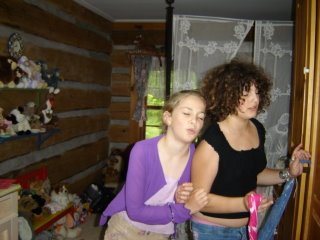
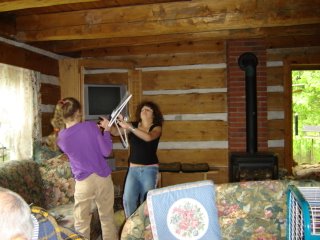 They're physically unalike, but in all other ways reflect one another to perfection. Dainty, quiet, lady-like little girls. Oh yes, indeed.
They're physically unalike, but in all other ways reflect one another to perfection. Dainty, quiet, lady-like little girls. Oh yes, indeed.
While we adults were outside, doing things of monumental importance in the rain, the girls were, for the most part, in the house. I say for the most part, because from time to time they would erupt outside dresssed for sun and warmth in the chill rain, cavort about, blithely ignoring our recommendations for rain gear, then suddenly, as one, dash madly for the house again. And in the house the stereo was turned full on. Popular girl sounds, popping and bopping all over and around the great room.
When, finally we three adults made our way back indoors, the work of setting up the new gas mower with the wider cutting blades, the mulch-factor, the how-to explained, and the demonstration satisfactorily performed, it was to a warmly inviting house, somewhat dimly lighted as a result of the heavy overcast, but still redolent of their lunch, not that long out of the oven.
The girls were rummaging through Angie's clothing cupboard, hauling out singularly flamboyant pieces to try on and flaunt, inventing bold new personalities for themselves, hobbling about on borrowed platform shoes and drunk on laughter of a pitch to challenge the whining female voices burbling out of the stereo. "Turn it down" had a double function, obvious to us, less so to the malefactors, whom giggling overtook to delirium.
These children are so well mannered, so attuned to the niceties of polite society and the dictums of approved behaviour. They perch atop the kitchen island to slurp down chocolate milk and devour chocolate chip cookies. They sprawl on Angie's mother's bed, the upheavel awakening tiny Karmen whose attempts to extricate himself and execute a self-rescue from their clutches fails miserably, poor tyke.
They wrench our hearts and souls with unmitigated love and admiration for their youthful urbanity as they quip one another to relentless exhilaration, shrieking with helpless laughter at their own perceived cleverness.
And Why Not? She Said
Sister Rose Thering. I had never before heard of her, knew nothing of her history, of her noble passion as a religious. But there it all was, laid out for me in the obituary section of my local newspaper. The headline read: "Inspired voice of dialogue among Catholics and Jews". What an admirable mission she chose for herself; to reconcile the Catholic Church to its debt to Judaism. She led the Catholic Church to recognize and finally reject, its ignoble attachment to the tried-and-true, much-embraced vilification of the Jews.
When I was a child growing up in an inner-city environment of immigrant families struggling to make a place for themselves in this country, living among lower-class, long-settled families of older Canadian descent, I vividly recall being publicly reviled for being a Jew. A Jewish child of 6, 7, 8 years of age, having to hear herself screamed at by other, older children, described as a "dirty Jew", and more often, "Christ killer". I must have brought my concerns and my queries to my father and mother, and presumably they did their best to explain. Truth was, I was a proud Jewish child, and nothing that I could be accused of, as a Jew, would wound me personally, but it did cause me to devalue Christianity because of this blatant enmity and obvious stupidity.
So Sister Rose Thering, a Roman Catholic nun, spent her life battling anti-Semitism within her church. She contributed to a historic Vatican declaration finally admitting that Jews were not, after all, collectively responsible for the death of Jesus Christ. Sister Thering entered religious life the very year of my birth: 1936. Sister Thering, it would seem, wore a Star of David along with the cross she wore around her neck. This woman devoted much of her life writing, lecturing and travelling the world on a personal mission to promote greater understanding between the two religions, an opening for dialogue and accommodation.
She was the recipient of over 80 humanitarian awards. She grew up on a farm in Wisconsin where distrust of Jews was endemic in her neighbourhood, and her parochial school, where Jews were spoken of in whispers, mentioned in catechisms and other religious texts, as Christ killers. Although she learned the messages of intolerance and hate early in her life she found them unacceptable. Searching through her students' Catholic textbooks later in her life as a teacher, she was shocked by the overt and detestable prejudice and hate she found there.
She resolved to act against what she identified as a fundamental flaw in church teaching, and the result was a study of anti-Semitism in Catholic texts, and a dissertation for her doctorate that condemned the calumnies preached against Jews and Judaism. When Pope John XXIII convened the ecumenical council, Vatican II, Cardinal Augustin Bea used Sister Rose's texts upon which to base his draft of the 1965 Vatican document Nostra Aetate, reversing church policy and declaring that Jews could no longer be held responsible for the death of Christ.
Took long enough, didn't it? That a Christian organization which holds itself aloft as representing the glory of God Almighty upon earth could with deliberation undertake to systematically and over millenia defame that very religion and its people from whom their own beginnings and their Saviour came, finally had to admit their gross unChristianity is amazing. That it took the dedicated and spirited activities of one sole woman who demanded justice is no less amazing.
Just last week my husband I were at a local gardening centre. We began a spontaneous conversation with a woman who was looking, like us, at culinary herbs for our gardens. She was a tall, large woman, very affable, and a passionate gardener. She wore around her neck a cross and with it a Star of David. At my age I don't hesitate to make comments or enquiries at times that others might think twice about. I asked her how it was that she was wearing both symbols of Christianity and Judaism. A broad smile covered her face, and she explained she was a Christian, but she was giving homage to the religion from which hers had derived.
Badges for Jews!
Well, why would we be surprised, after all. History tells us that ancient Persia is where it all started. History has its brutal way of re-visiting itself. History has a way of re-visiting the brutalization of Jewish identity. In fact, we don't really know where and when it all started, but a good guess would be where Jews lived in ancient times: the Middle East. Now that wasn't hard to deduce, was it? It would seem the earliest recorded history of a mandated visual clue setting Jews apart from those among whom they lived in the Middle East was in 807 c.e. during the reign of the Abbassid caliph Haroon (Harun) al-Raschid, otherwise celebrated as an intelligent and just ruler. But in the case of setting the Jews apart for easy identification, a yellow belt and a cone-shaped hat did the trick.
Wait: a pattern emerges. Islam, the religion of harmony, justice and peace as exemplified by the Shi'ite dominated theocracy of Iran is poised to re-enact just such clothing enhancement through the Iranian parliament. The Islamic Majlis this week passed a law setting a dress code for all Iranians which would require Muslim Iranian citizens to wear "standard Islamic garments". No more western-style garments, or a mix of Islamic and western-style. This is serious stuff, calling for an all-out commitment among Iranian Muslims to prove they exalt Allah by surrendering their personal style of dress to a single, unalterable dress code.
And just incidentally, that same law will require Iranian Jews and Christians and other minorities to wear identifying colour badges, to set them apart visually from the religious majority. The world-esteemed Iranian President, Mahmoud Ahmadinejad has urged the Iranian parliament to fast-track this process to enable Muslims to deliberately avoid contact with non-Muslims. Obviously, there are no behaviours and edicts against minorities within Iran too odious not to be re-visited.
About now is when I would like to see a response from the Muslim world at large. It would be interesting and most appreciated to know that there would be a groundswell of opinion and denial from Iranians in general in protest against this move, but I'm not holding my breath, although I do know that Iranians in exile will be quick to condemn the imposition. What I'm really waiting for, let's say, even with bated breath, is for the Muslim community at large to voice its objections.
On the basis that this edict degrades Muslims in general. On the basis that this edict does great harm to Islam. On the basis that Iran continues to disservice itself on the world stage, and its people surely deserve better than to be led so disastrously by a hateful and aggressive leader, serving an equally vicious religious dictatorship.
The Slippery Slope of Responsive Humanity

"DOUBLE AMPUTEE CONQUERS EVEREST"
Well, wow, that's some feat. Difficult in the extreme for ambitious mountaineers in the prime of their lives, with all of their limbs intact. For a double amputee that's some ambition, some output of determined energy, some prize. I'm personally fascinated with mountain climbing. And those ascents requiring years of preparation, months in the doing in at the various base camps, acclimitization, fierce discipline, well, it represents a feat of human endurance beyond my understanding. For those whose desire it is to conquer the mountain, who can criticize?
Perhaps a gentle critique, in the manner of why would they feel so emotionally compelled to ascend this mountain and others like it? True, the views are unparalleled, but one needn't go to such incredible heights to attain breathtaking views of height, distance and breadth.
Ascending a four-thousand foot mountain within a range of similarly-heighted mountains offers one quite similar views. But of course there are always those who relish pushing their bodies beyond what most people would consider to be reasonable endurance.
In any event, it was fascinating, as always, to read about this singular adventure: a 47-year-old New Zealander who 24 years previously had lost his legs to a climbing accident, undaunted by his artificial legs and ascending the fabled Everest despite them. He was not alone in his efforts, as there was a contingent with whom he shared his efforts, and one does wonder whether someone else gave assistance at times. Aside from the fact that the Sherpas hired to accompany climbers always assign one of their numbers to go ahead of the group and secure lines of passage, while others set up tents, boil tea, prepare meals and, in essence, do all the "work" associated with setting up camp at the various levels. And oh yes, carry most of the critical supplies from food to tents, oxygen tanks and other necessities. Freeing the "climbers" to, well, climb.
What really arrested me was what one of the members of Mark Inglis's (the prostheses-wearing climber) climbing team related to the news media. A not-unknown occurrence, but on occasion one that compels climbers to abort their personal ambitions in favour of giving assistance to another climber whom misfortune's death mask has grinned upon. Evidently Wayne Alexander, one of Mr. Inglis's three climbing companions described an incident during the final ascent:
"We came across a chap sheltering under a rock, who was perhaps hours from death. that was probably only 2-1/2 hours into the climb. He had made a mistake the day before. He started too late and couldn't get off the mountain. That was a very sobering reality, that every pace you took further from that point was further from safety, and we had to all make it back. It didn't deter Mark."
The article further stated that it was not known what happened to the climber they passed on the way up. I have, of course, read of other ascents by other climbers who were sobered by seeing a corpse, recent and otherwise of climbers whose ambitions had taken them up Everest in their own bids to reach the summit. Just as I've read, as stated above, that some climbers, coming across a would-be summiteer in dire straits had elected to sacrifice their personal ambitions to the imperative to assist the climber-in-distress to effect a safe descent.
Obviously, no such abortion-of-purpose was contemplated by this brave crew. They duly noted the mortal distress of this unfortunate climber, related his condition to their own chances of success and imperilment, and pushed on. Rivetted on their own egotistical ambition. I try to get my mind around this, that this group assessed this stranger's physical condition, his chances for survival, and they rejected their own responsibility toward another human being in need.
At the summit, in jubilation the double amputee, Mark Inglis telephoned his wife by satellite telephone to trumpet to her the success of his efforts. She would, no doubt, be proud of her husband.
Dear Diary
 Another wet day. Not too windy, cooler than yesterday. I used too much shredded cheese in our breakfast omelette. As usual. But breakfast is a treasured, leisurely event with us and it hardly matters. Irving left over that portion of his omelette which was too cheese-heavy and offered it to me, and as usual I ate it. I put off cleaning the bathrooms in favour of taking Button and Riley out for a ravine walk as early as possible, just in case it began raining again.
Another wet day. Not too windy, cooler than yesterday. I used too much shredded cheese in our breakfast omelette. As usual. But breakfast is a treasured, leisurely event with us and it hardly matters. Irving left over that portion of his omelette which was too cheese-heavy and offered it to me, and as usual I ate it. I put off cleaning the bathrooms in favour of taking Button and Riley out for a ravine walk as early as possible, just in case it began raining again.
The tree trunks in the ravine are dark with the penetration of another all-night rain, contrasting sharply and beautifully with the bright limey-tone of the newly leafed canopy. We thought the trails were mucky yesterday, but they were perfectly fine compared to the slush we encounter today. The wild apple trees are nicely in bloom, the dogwoods are beginning to shape their flat floral sprays, the ferns are coming up apace, and ground cover is swiftly filling in the bare spots under the trees. In the very wet areas jewelweed has spread overall, looking like bits of watercress.
The cardinal's intense trills follows us half-way through our circuit, but today we don't glimpse his crimson plumage. The creek is running full, gurgling over the latterly-formed gravel bars, gushing in miniature waterfalls of muddy water over the accumulation of water-logged branches caught on the edge of the creek; the accretion of roots dabbling in the creek from the trees poised awkwardly above. There is an indelible odour of wet needles, old leaves.
Later, Irving busies himself again mixing black earth, sheep manure and peat into our wheelbarrow for distribution once again into the balance of our garden pots. I plant a few more perennials; another phlox, another liatrus that I just could not resist. (For we had taken time out to peruse the gardening offerings at another locale, and had been smitten with the variety, the robustness of the plants, and then, of course, submitted to the imperative to acquire more. Bacopa, Million bells, geraniums, lobelia, potato vines, heliochrysm. Thank you!) I begin to distribute the pink and the red wax begonias into various flower beds, just on the border, in a bit of semi-shade, while the white impatiens are placed into our little half-moon stone pots that border the pathway.
A few neighbours haul themselves over, and I promise to divide and distribute a few of our perennials, good and mature as they are, ripe for division. The candidates on this occasion are campanula, hostas and hydrangea. These neighbours are just budding gardeners, and listen intently to my descriptions, advice, and assurances that these plants need little to no care at all.
The canvass kit for the Canadian National Institute for the Blind is delivered to me, just before dinnertime. The person who brings it over is someone who has delivered these, and those for the Heart and Stroke, and for the Arthritis Society, for years. She lends herself to these charitable organizations, offering to deliver canvass kits, but declining to canvass door-to-door herself, if she can help it. And who can blame her? She speaks in a rapid-fire staccato that takes some getting used to, to fully understand her words. English is her second language, and it shows. Her grandchildren live with her; her daughter has had some very unfortunate alliances and this grandmother picks up the pieces.
After dinner I prepare to go out to begin the canvass, eager to begin and at least make some impact on getting the job done, since it is, after all, mid-month. Riley stands beside me at the front door, anxiously watching me prepare to leave the house. He's always a little pill about my absence and moons about unhappily until my return. He and Button behave as though I've been gone, unaccountably, and tragically for years, whenever Irving or I leave the house for any reason. I step outside, and stop on the porch. No wonder it seemed so dark, it's raining.
What to do? I telephone my sister in Toronto, just to keep in touch. We don't, after all, do such a terrific job of keeping in touch. My sister, incidentally, is legally blind. She's four years younger than me; her eyesight was always compromised, the result of a forceps-assisted birth. I speak first to my brother-in-law who assures me he is still swimming at the local "Y" five times a week. And good on him. I want to know how his daughter, who is undergoing a protocol of electro-shock treatments, because psychotropic drug therapy hasn't helped her, is doing. Well, he says, tentatively, she seems livelier, afterward, although immediately following treatment she's a little woozy.
When I'm speaking with my sister, she tells me she sees no difference yet at all. But this is only the eighth treatment session, so it's early days, after all. Yes, my sister says, they are still going out for daily walks. Yes, she feels pretty good. Well, maybe not so good. But they do go out walking. And dancing. Their last dance lesson in the series is this week, but they'll go out to the local community centre for their twice-monthly seniors dances. Something they've been doing for years. And, reports one of my very old friends with whom I communicate by email, they're very good. My friend also dances. She and her 80-year-old boyfriend. She speaks of my sister's and brother-in-law's dancing proficiency with admiration and envy.
We re-visit old times, talking about our mother, our father, our impressions of them at the time, when we were young. And how it is that one of our brothers is so distant and removed, so unwilling to be in any manner of contact with any of his siblings. How we always thought of our mother as "old" and stodgy. Simply because she was. About our relationship with our father. Which, said my sister, was non-existent. He was there, but not quite there for us.
Another entry on another day of life.
May Perfection


 We've had so much rain. Who could imagine this would turn into such a perfect day? Overnight rain, morning rain, so no incentive to rise early. A nice leisurely breakfast, reading the newspapers, taking our time. After clean-up, a walk in the ravine. The rain has stopped, the sky still rent with dark layers of clouds. Anybody's guess whether it will rain again, and soon. So we wear our yellow raingear, and off we go.
We've had so much rain. Who could imagine this would turn into such a perfect day? Overnight rain, morning rain, so no incentive to rise early. A nice leisurely breakfast, reading the newspapers, taking our time. After clean-up, a walk in the ravine. The rain has stopped, the sky still rent with dark layers of clouds. Anybody's guess whether it will rain again, and soon. So we wear our yellow raingear, and off we go.
The creek is running full tilt, thanks to all the rain we've received in the past week. The trails are as wet as they ever get, with puddles of muck here and there. We've half-filled the laundry sink with warm water in anticipation of our return with two clay-footed little dogs. Meanwhile, all of us plod through the puddles. Taking note as we proceed, of the state of the trilliums, the trout lilies, the wild strawberries, and looking carefully for the shy heads of Jack-in-the-Pulpits, happy to be rewarded by sighting their purple-striped nodding heads near the creek tributary which they've colonized. In fact, the trilliums, foamflower, trout lilies and finally, Jack-in-the-Pulpits that we transplanted into our garden from the ravine years ago are in colourful evidence in our own gardens. The richness of our garden soil has encouraged the proliferation of foamflower and giant-sized Pulpits.
Not only does the rain hold off, but the sky begins to clear, the sun peeks out now and again, and we're beginning to feel decidedly warm. Off comes the raincoat, and it is tied by the arms around my waist. Oh, goody! say the mosquitoes, and they begin to feast to their nasty little hearts' content. They flock around our little black female Poodle and try their best to visit misery upon her, but her owner busies himself brushing them off her. None of the tiny nasties bother our Apricot male Poodle; it's his odiferous male hormones and his colour. Speaking of colour, how unfortunate I chose to wear a long-sleeved black t-shirt; for that colour attracts the avaricious little beggars like no other, and my partner is having a good time slapping them off me, secure in the knowledge I won't protest at his constant "brushes". For my own good, of course.
It's Tuesday and that's the 20%-off day for seniors at the Sally Ann thrift shop. Not our own, which we so bitterly miss since arson obliterated it from our near landscape, but another one, not nearly as good, but passable, some miles away, is the one we drive to. A careful search brings us a bonanza of gently-worn, good quality summer clothing, some of which will be gifted to a special little girl. We are able to select some good books, among them an Alice Munro short story collection for my special delectation.
On we go then, to the Cleroux greenhouses, our favourite spot off the highway for our annual selections of begonias, both wax and tuberous. As usual, we're undecided when we see the bold, delicious colours and finally select a flat of red, one of white, another of pink, and a yellow. We get a flat of ornamental fountain grass, one of lobelia, two of wax begonias, then turn our attention elsewhere. One single tomato plant is all I need for us to enjoy a lovely fall harvest. Along with curly parsley, chives, lavender and oregano.
At home I set about separating and digging up hostas, echinacea, heuchera, columbine, bleeding hearts, pot them up and set them aside to take along to our daughter's house to be planted into her garden. Mohinder comes by for a chat just as Irving has finished mixing black earth, peat moss and sheep manure into the wheelbarrow for the purpose of filling up some of our clay and stone garden pots. We won't fill all of them this day, but we'll get a good start.
Both dogs decide to snuffle about the garden beds, seeking bits and pieces of compost that they so relish, to our great disgust. These are dark, dry, desiccated pieces of fruits and vegetables long past any recognition of their edible incarnation, but they are beloved of these two little dogs, to our immense frustration. I lecture them, order them to remove themselves from the garden beds, and when needed, remove the dried bits from their sad little mouths.
I see that annual California poppies have seeded themselves, along with a multitude of other annuals, in various parts of the garden. Morning glories make their first appearance, so I know I'll have an abundance of glowing blue flowers vining up the fence, again. Columbine are beginning to throw up their flower heads, and the Forget-me-nots are everywhere in bloom. Tulip heads still offer their bright candy colours, and the grape hyacinth have proliferated in the borders presenting a unified splendour of blue. The Sargenti crabs are full of bright pink blossoms; the Jade crab of lighter pink; the apple trees barely pink. Creeping phlox enriches the rock garden with its bright pink florets; the fritalleries nod their dappled heads.
The temperature has risen to a truly balmy 20 degrees centigrade, with a slight breeze, and now and again the sun blazes through the clouds which at one point almost dissipate. Only to return later in the early evening when we've prepared to put on the barbecue for dinner. We're still talking perfection here.
Take Your Pick
All right, ladies, step right up. It's fine, don't worry, those among you who are not ladies, but merely female with aspirations toward ladyhood may also step up. Into the breach, that is. The rearing breach. Those among that portion of the population who, being female, also professing to a personal interest in becoming a mother, this is for you. The question of the day is: stay home - or - out and about.
Home, to look after the children's welfare. Home, to be a full-time caregiver, partner-in-marriage, housewife, active member of your close community. This group feels that the responsibility of rearing their children remains with them, not with any alternative childcare agency, be it another responsible adult, or group placement. You personally see your children through infancy to childhood, emerging teens, young adults. All of the hallmarks of physical and mental attainment are guided by you through your constant presence, and care. This is the "traditional" view of motherhood, seeing your children develop, stimulating their awareness and growing learning skills, socializing them, endowing them with values reflecting your own. You are home when your children arrive back from school. They will remember that you were there, always. To share the school day's interactive news of the day, to salve hurt feelings, to explain inexplicable situations, to help with homework, to serve up fresh-baked cookies and milk.
These mothers feel taken for granted, devalued by a society that expects all of its adults to contribute in ways seen as meaningful to the society at large. For the most part, the fact that stay-at-home mothers contribute to their society by raising well-adjusted, emotionally burnished children who pick up their parents' values through the osmosis of observation seems to be overlooked by the critical onlooker. The work involved in raising children in a well functioning home, be it with two parents or one, (good luck if you're a single mother) tends to be overlooked in favour of the importance seen in a working mother's more direct-appearing contribution by raising the GDP; earning a living, contributing to the commercial aspects of society's expectations.
Ah, the mothers who, through tight financial circumstances, single-parenthood, boredom with time away from adult interaction in the workplace, ambitions to succeed in a determined career path, life is no bed of roses. They've chosen, or they have had the decision imposed upon them by circumstances beyond their control, to work outside the home, their children's daily care given over to a paid surrogate. Whether this child-minder is someone in the family such as grandparents, or a neighbour who takes in children for a fee, or a community-based child-care centre, the daily communication, interaction, guidance and observation of their child's needs and development are truncated by necessity and outside the immediate purview of the parents. Much will be missed, never to be retrieved, from developmental milestones to opportunities of guidance and inspiration.
In the process, women will find extra satisfaction (or not) in pursuing a career, or just simply earning their way through a paying profession or job. They know they will miss much in emotional contact and support on a daily, ongoing basis with their children and accept that as an unfortunate byproduct of choice or necessity. They also in the process take on an emotional and physical burden that demands rejection of some elements of motherhood and housewifery. The tradeoff buys a little more time squeezed out of a seemingly impossible daily routine. And the outcome is a perpetually fatigued, sometimes guilt-ridden lifestyle. This has an undeniable impact on mental and physical health of the mother. Children who are not cared for and supervised closely by a parent too distracted to pick up signals also suffer.
Take your pick. This is an imperfect world.
Tomboys United!



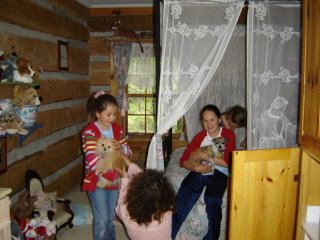 They're little girls. Three of them. Oops, and a spare. So that makes three and a half. Three ten years of age, and one a mere six years old, barely tolerated by the older girls, but having a very good time hanging out with them. Sugar and spice and everything nice. As opposed to say, boys for whom frogs and dogs' tails are the order of the day. Girls and decorum. Boys and mayhem. Oh yes indeed.
They're little girls. Three of them. Oops, and a spare. So that makes three and a half. Three ten years of age, and one a mere six years old, barely tolerated by the older girls, but having a very good time hanging out with them. Sugar and spice and everything nice. As opposed to say, boys for whom frogs and dogs' tails are the order of the day. Girls and decorum. Boys and mayhem. Oh yes indeed.
These girls race around the house, chasing the dogs, and there are plenty of little beasts to chase. The large dogs just look a trifle concerned, but don't move. They know the chase isn't on for them, but rather for the small, the really small ones. The cat, too. And he will have none of it. The cat, a large grey neutered male, strikes a stance, then leaps prodigiously right over their heads and literally sails out of the room. I cannot believe the testimony of my eyes.
Ahah! the 3-1/2-lb Pomeranian has been cornered and caught. He is clasped lovingly in two small hands, held out of the reach of the other greedy hands, and yes, tossed in the air, and handily caught. The 8-lb Chihuahua, normally begging to be picked up has been cornered at the edge of a sofa and sits there, snarling, but he is snared and caught up like the other. He is cuddled, not tossed, and turns his tiny head under his captor's arm.
The girls decide to reward the dogs for their patient participation in the antic proceedings and in the kitchen take solemn stock of the possibilities from among the various treats meant for the dogs. The dogs sit expectantly, eager and very willing to accept any and all offerings. When the appropriate treats for each of the applicants-for-reward have been determined the crush of hot bodies giving and receiving becomes a tangle of colourful limbs.
The girls race up to the second floor amid shouts and screeches and squeals, all human in origin, all animal in intensity and texture. They leapfrog, they turn somersaults, they exclaim, they declaim and they challenge one another to the highest-pitched shriek, the most perfect somersault, the most daring leap. Oh dear, the girls are ordered out of doors. What took so long?
Out they stream, teasing one another, boasting their running prowess, and all of them greyhound around the perimeter of the house, the breezeway, the guest cottage, and back again. The door has been opened and all of the dogs rush outside right after the girls, in hot pursuit this time of their targets and pandemonium reigns supreme.
The girls rush for the garage, each toward a different object promising further opportunities of athletic endeavour. There are two bicycles, a skate board, a scooter and each is claimed and becomes a vehicle for physical interaction, skids, turns, and bypassing. There are exchanges. The bicycles, skate board and scooter change ownership and off they go again. The air hangs heavy with claims and counterclaims. Suddenly, silence, and the girls stream back into the house to claim apples, fresh-baked chocolate chip cookies, milk. The dogs leap around them expectantly, anticipating crumbs that just do not materialize, alas.
Outside again! Hula hoops, basketballs, and the electricity of motion and emotion crack the atmosphere. Girls are so sweet, so biddable, so calm and serene. So hysterically comic in their earnest girlishness, their frantic boylike behaviour.
I Will Then, Said the Little Red Hen
 What a morning. Darkly overcast, windy, and rain, lots of it. We had all-night rain following on the previous day's rain. So today is to be yet another acquarium day. Cool, wet, windy. Don't mind, really. If, at some point during the day the rain mellows out a bit so that the ever-burgeoning canopy in the ravine might give us partial shelter, we'll get out there for our usual daily walk-about. The search of the moment is for Jack-in-the-Pulpits, our favourite spring flower.
What a morning. Darkly overcast, windy, and rain, lots of it. We had all-night rain following on the previous day's rain. So today is to be yet another acquarium day. Cool, wet, windy. Don't mind, really. If, at some point during the day the rain mellows out a bit so that the ever-burgeoning canopy in the ravine might give us partial shelter, we'll get out there for our usual daily walk-about. The search of the moment is for Jack-in-the-Pulpits, our favourite spring flower.
Today's menu pops into my head. We'll have a tomato-based vegetable soup, chock-full of dried peas, beans, and fresh-cut vegetables. Truth is, the menu didn't just pop into my head; we knew yesterday that today's weather would be a repeat of the day before, so last night I set the legumes in a bowl to soak overnight. The resulting soup, lovingly simmered for hours, gifting the chill house with its delectable promise of an evening repaste will be, for cooking dummies, similar to Campbell's tomato-vegetable soup, but cooked by moi, not some tasteless corporation.
What better to go with that hearty soup than a bread? Not just any bread, but one as stuffed with grains and seeds as the soup will be with vegetables, dried and fresh. After breakfast, I stick a small bowl holding a cup of milk into the microwave and let it zap. I sprinkle a tablespoon of yeast into a cup holding a quarter cup of warm water into which a half-teaspoon of sugar has been melted. And set it aside. Truth is, I've done variations on this particular theme thousands of times; could perform the task blindfolded with one arm tied behind my back. Um, forget the tied arm, otherwise how to knead the dough?
All right, out comes the scalded milk, in goes a splash of olive oil, a scattering of salt, a generous heaping of wheat germ, half-cup of triticale, another of psyllium, of quinoa, and flaxseed, and yes, sunflower seeds. I dump into this mash a cup of whole wheat flour, and stir; more flour, stir, flour again, then dump the mess out onto my floured baking counter and begin to knead. I knead until the dough has absorbed one offering after another of additional flour and it has become a soft, smoothly pliable ball. Finished. Now it will rest and rise, and I put it into a bowl, pour a bit of olive oil over it, roll it about to completely film with oil, then cover the bowl.
I plan to bake the bread Italian style, as a focaccia. I'll smooth it down into a large round cornmeal-sprinkled pan, drizzle olive oil over the top and knuckle it in. Then I'll sprinkle the top with thyme, and grate a nice old cheddar cheese over it. Perfect with the soup. And for dessert, if we've still got room, we can have a slice of the carrot cake I baked on Friday, with its cream-cheese icing.
And then I stare at my sink counter in disbelief. There, sitting in bold defiance of the process I've just completed is the cup holding the yeast, now risen to the rim in expectation of taking its rightful place within the belly of my bread dough. That very same bread dough that has gone through the finishing process, and will never, ever, find it within itself to rise to the occasion. Bloody damn!
Into the garbage with it, and the process starts all over again. The Little Red Hen needs a refresher course.
Button the Snorthog
 She is small, a miniature Poodle. She is black in colour, but for a few patchy grey streaks back of her legs that she has always had, even as a puppy. She is twelve years old, and still as energetic and mischievous and playful as ever she was. People infer from the grey streaks that she must be old, but I explain the grey is part of her colouration, not indicative of her age. She has large, expressive eyes, notionally button-like, and hence her name. Truth is, she is not pure-bred, but a mix of Pomeranian and Poodle. Her physical characteristics are generally Poodle in origin, as is her acute intelligence. From the Pomeranian side she has inherited stubbornness and no little amount of bossiness.
She is small, a miniature Poodle. She is black in colour, but for a few patchy grey streaks back of her legs that she has always had, even as a puppy. She is twelve years old, and still as energetic and mischievous and playful as ever she was. People infer from the grey streaks that she must be old, but I explain the grey is part of her colouration, not indicative of her age. She has large, expressive eyes, notionally button-like, and hence her name. Truth is, she is not pure-bred, but a mix of Pomeranian and Poodle. Her physical characteristics are generally Poodle in origin, as is her acute intelligence. From the Pomeranian side she has inherited stubbornness and no little amount of bossiness.
Although another little dog shares space in this household, she is the Alpha. The other dog is a pure-bred Poodle, a toy variety, Apricot-coated, and male. He is six years of age. He has been cursed with more than his share of testosterone and his aggressiveness toward other dogs is a constant source of irritation and embarrassment. His name is Riley and he is sweet and lovable and requires constant cuddling which Button does not. He knows she is the boss, yet occasionally will assert himself. She tolerates him.
We erred this spring, deciding, since we had missed spreading the compost from our garden compost bins in the fall, to do it in the spring. In so doing, we innocently-enough provided Button with her very own Paradise-on-Earth. Surrounding her home environs, within her very own territory, manna fell from heaven. Its fragrance, which at first almost knocked us off our feet, was sweet and promising to her. In this single instance, stupid little Riley turned out a superior intelligence. It was she, not he, who attempted to roll in ecstasy on the dark, dessicated, still wet compost. It was she, not he, who found this especial nibbling-source so irresistible. It was she, not he, who occasioned us to have to accompany her out of doors on every and all occasions to ensure she would not indulge overly on the stinking mess laid over our gardens.
She has honed her cunning. In the flash of a momentarily-averted eye she is capable of dashing to a sheltered space in the garden and indulging, in a flash. We threaten, we cajole, we warn, we disavow her, but nothing seems to work. I've warned her that we will withhold hitherto-attractive treats if she continues this behaviour, but nothing is permitted to curtail her great pleasure in life, and she continues to devour what she can, when she can.
She is devious, an opportunist of the first order. She is nothing if not resourceful. Withhold her special treats? Hah! Each day as we hike through the ravine across from our home, once halfway through the hour's trek, Button and Riley customarily anticipate their very special treats, and small bits of a flexible, chicken-flavoured strip-concoction are offered for their delectation. What's left over remains in a small plastic bag and shoved back into my pocket. On the latest occasion the pocket resided in a pair of trousers I'd worn to the ravine.
Why was I not surprised to discover she had winkled the bag out of the pocket as the trousers hung in our clothes closet, and left the now-emptied bag as a cocky admonition for my discovery. Gotcha!





















